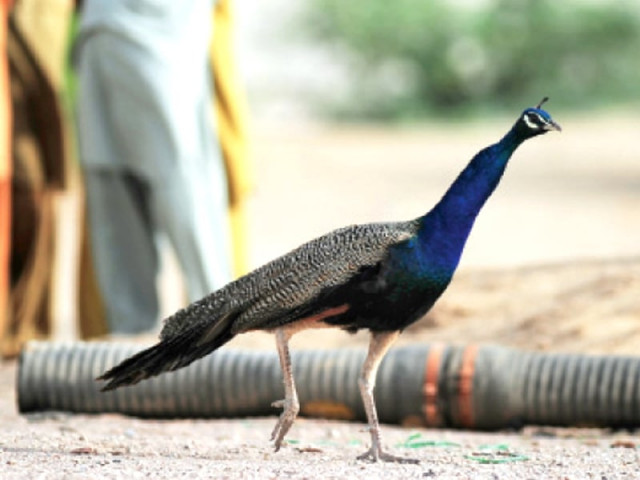Precious peacocks
Last year, in 2012, Pakistan lost 300 peacocks to the deadly Newcastle virus.

Ssince June at least 60 peacocks have died due to the Newcastle disease. PHOTO: FILE
Unfortunately, the disease is back and threatening to take away one of the most beautiful populations of birds in the world, 80,000 of which exist in the Thar district. Let us take this time to thoroughly investigate, learn and understand Newcastle disease so that we can protect Pakistan’s aviary life from future affliction.
There are multiple reasons that we should pay attention to this disease and mitigate its spread. Firstly, this virus that is found primarily in birds is contagious, meaning it can be transmitted from peacocks to other birds.
This includes both domestic and wild birds and as such, given the prevalence of poultry farming, particularly in the dozens of villages across Thar where these peacocks are inflicted, the disease must be controlled more stringently.
Additionally, the disease is transmissible to humans through excretory fluids and faecal exposure to infected birds. Shoes, clothing, food and equipment can easily become contaminated out in the field.
And though it is not life-threatening to humans, given the other ailments that villagers have to face, it is important that we stop the spread of Newcastle disease so as not to compound their disease woes further.
Implications for humans must be studied and high-level research should be carried out. There also needs to be a mechanism to identify and register the birds that have been immunised but while administering medicine to remaining aviary wildlife is a necessary measure, it was not sufficient the last time around.
If we had done a better job of investigating and understanding the virus last time, we might have been better prepared to deal with the disease this time.
The wildlife and poultry departments should step in together more proactively with a disease control task force at hand, to resolve this issue.
Published in The Express Tribune, July 22nd, 2013.
Like Opinion & Editorial on Facebook, follow @ETOpEd on Twitter to receive all updates on all our daily pieces.














COMMENTS
Comments are moderated and generally will be posted if they are on-topic and not abusive.
For more information, please see our Comments FAQ